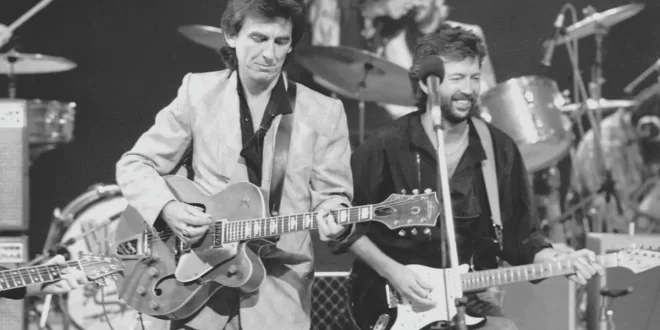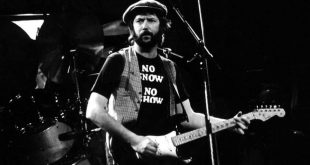“While My Guitar Gently Weeps” stands as one of The Beatles’ most haunting and iconic songs — a track that transcends its era and has become a timeless staple of rock history. Whether it’s the searing guitar solo that evokes deep emotion or the memorable scenes in pop culture referencing it, the song embodies The Beatles at their most creative and heartfelt.
Yet, the song’s recording features something unusual for The Beatles: a guest guitarist. Eric Clapton’s name on the credits raises eyebrows because The Beatles rarely, if ever, invited outsiders into their tightly knit recording sessions. So why did George Harrison break this unspoken rule and bring in Clapton to play the lead guitar on one of his most personal compositions?
The Beatles’ Close-Knit Studio Dynamic
Throughout their career, The Beatles were known for being a close unit in the studio. The band prided themselves on creating music as a collective, with only a handful of exceptions where outside musicians contributed, such as Billy Preston on Let It Be. Usually, any individual member who wanted to experiment or record something different would do so privately, like Paul McCartney working alone on some tracks.
Bringing an outside star like Clapton into the fold was, therefore, a big deal. But Clapton wasn’t just any guitarist — he was George’s close friend and widely regarded as one of the greatest guitarists alive. Still, Harrison himself was an accomplished player who wrote the song and was perfectly capable of performing the solo.
The Pressure Behind the Invitation
According to Eric Clapton, his initial reaction to Harrison’s invitation was hesitation. He thought, “I can’t do that. Nobody ever plays on Beatles records.” Clapton admired the band but felt the pressure of such an unusual opportunity. It was George’s passion and insistence that eventually won him over.
This decision wasn’t just about technical skill — it was also a strategic move by Harrison. During the White Album sessions, there was tension in the studio. John Lennon and Paul McCartney were critical of Harrison’s songwriting — with Lennon openly admitting that there was “an embarrassing period when George’s songs weren’t that good,” and McCartney privately sharing similar sentiments. Ringo Starr, meanwhile, was mostly disengaged at this time.
Feeling undervalued and frustrated, Harrison wanted to make a strong statement. Bringing in Clapton, a guitar virtuoso, to add a powerful solo was a way to raise the profile of his song and command respect from his bandmates. It was a subtle but bold move to shake things up and assert his creative voice.
The Impact of Clapton’s Presence
Harrison later explained how Clapton’s presence affected the atmosphere in the studio. Not only did it bring fresh energy to the sessions, but it also caused Lennon and McCartney to “act more handsomely” — in other words, to behave more respectfully and professionally. The presence of a third party, especially someone of Clapton’s stature, helped keep the peace and encouraged a more focused session.
The track itself was already in demo form when Clapton arrived, but his contribution pushed it from tentative to transcendent. Harrison remembers listening to the final take repeatedly, clearly pleased with the result.
Clapton, meanwhile, recalled that Lennon and McCartney were somewhat “non-committal” about the song during recording, but Harrison’s enthusiasm was infectious. “I knew George was happy because he listened to it over and over in the control room,” Clapton said.
A Legacy Cemented
The collaboration produced a moment of pure magic: Clapton’s emotive solo became inseparable from the song’s identity, and the track is now seen as one of Harrison’s masterpieces on The Beatles (the White Album). It stands out not just for its musical brilliance but for the story behind its creation — a testament to friendship, artistic validation, and breaking boundaries.
Though guest musicians remained rare in Beatles records, Harrison’s decision to bring in Eric Clapton on While My Guitar Gently Weeps proved that sometimes, inviting an outsider can create something truly legendary.






